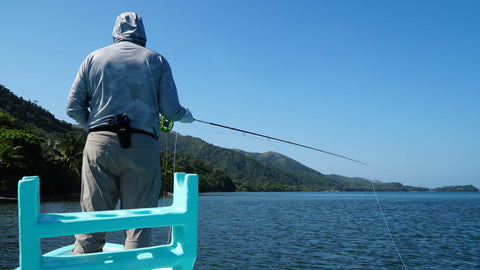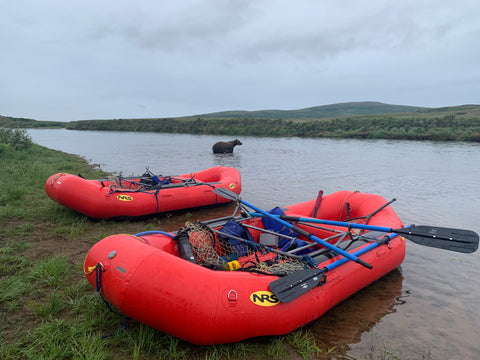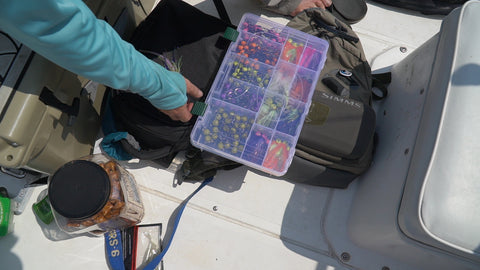
I guided three seasons in Alaska and fished with a broad spectrum of people. A third of them were decent fly fishers, a third were rote beginners, and a third were what we called “anglers.” You might guess who caught more fish; as skills develop it stands to reason that a fly fisher of average ability catches more fish than a newcomer on a guided trip. But it’s not that simple, because the beginner often possesses what the intermediate or advanced fisher gave up long ago: coachability. A beginning angler who follows a guide’s direction to a T may stand a better chance of catching fish than an intermediate or even advanced angler who whips the water into a froth and casts, presents the fly and looks for fish in all the wrong places.
While there are rookie guides who truly don’t yet really know what they’re doing, it is a safe assumption that this is not your guide’s first trip down the river (or lake, or flat, or whatever). Even if it is, your guide has probably absorbed institutional knowledge from the lodge or business in question, in addition to their own (often keen) observations. Typically there is some amount of camaraderie amongst guides that produces a relatively fluid stream of knowledge through the ranks. In other words, just because the guide may be young, they’re probably not clueless. Unless you’re some sort of travel agent or gear rep, (someone who takes trips all over the world every year), or a former guide with experience in the fishery, the guide probably knows more about the water than you do. So please, have a bit of faith.
Never ask a guide “do you have a plan?” It’s an inherently critical and, to me, a rude question and supposes that the guide is just out there winging it. In reality, a good guide has probably been thinking about their plan all that day and the night before, as it relates to every other plan on every other day they’ve seen that season. A more respectful way to ask essentially the same thing is, “what’s the plan for today?” It’s a subtle difference, but when the question is posed this way it implies that there IS a plan, and the guest just wants to know what it is. It’s less accusatory.

Here’s one that your guide will want to hug you for: practice. The guide can tie on the right fly/lure, put the boat in the perfect spot, get the boat positioned at the best angle to the wind, but they can’t catch the fish for you. That comes down to how good you are with a rod in your hand. And even a moderate amount of practice can make the difference between a fish worthy of bragging rights and an evening of drinking away your frustration. It’s really not that hard to set aside just a few Saturdays for practice in line management, target practice, distance practice, and casting in the wind. Trust me: you’ll thank me, and your guide will thank you.
Ask questions. If you’re fishing, you’re most likely in a beautiful place. Doesn’t matter if it’s a trout stream or a flat or a bass reservoir. There’s most likely some history and little factoids about the environment that a thoughtful person might find interesting. Maybe it’s my personal bias, but I almost took offense to people who just showed up with big fish blinders on and whipped the water into a froth without asking me anything about the lives of the fish and the history of the environs. These waters, places of recreation and wonder and rejuvenation, are deserving of interest. So ask questions. You might just learn something interesting.
Give your guide something. That could be a snack, a beer, a drag off your fancy flask or cigar, a compliment, whatever. Chances are, since you’re spending hundreds of dollars a day on fishing, they make a lot less money than you. And, as has been mentioned previously, they are susceptible to judge their experience based on the actions of the clients (in Alaska we called them “dudes”). So, to produce good vibes in the boat it’s a great idea to bring a little something. It doesn’t have to be alcoholic (of course, not every guide drinks). But you could bring some delicious smoked salmon, some chocolate, perhaps sausage. Or, how about some commercially or custom-tied flies? New strike indicators? Fly tying materials? A reel! Ok that’s wishful thinking, but not unheard of. Make their job easier. No matter what, it will be a good gift, to someone who is really busting their tail for you.

All of this boils down, more or less, to civility and respect. Recognize that you are a guest, not only of the guide, but of the water. Have humility, respect for your environs, whatever they may be, and reap the rewards. Your guide is working for you, 100%.
That’s how to be guided.

